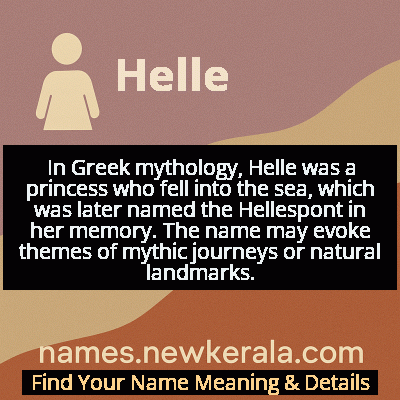Helle Name Meaning & Details
Origin, Popularity, Numerology Analysis & Name Meaning of Helle
Discover the origin, meaning, and cultural significance of the name HELLE. Delve into its historical roots and explore the lasting impact it has had on communities and traditions.
Name
Helle
Gender
Female
Origin
Greek
Lucky Number
6
Meaning of the Name - Helle
In Greek mythology, Helle was a princess who fell into the sea, which was later named the Hellespont in her memory. The name may evoke themes of mythic journeys or natural landmarks.
Helle - Complete Numerology Analysis
Your Numerology Number
Based on Pythagorean Numerology System
Ruling Planet
Venus
Positive Nature
Harmonious, responsible, caring, and artistic.
Negative Traits
Overly idealistic, superficial, possessive, or jealous.
Lucky Colours
Pink, turquoise.
Lucky Days
Friday.
Lucky Stones
Diamond, turquoise.
Harmony Numbers
2, 3, 9.
Best Suited Professions
Artists, musicians, teachers, healthcare workers.
What People Like About You
Warmth, nurturing nature, artistic flair.
Famous People Named Helle
Helle Thorning-Schmidt
Politician
First female Prime Minister of Denmark
Helle Helle
Author
Award-winning Danish novelist
Helle Virkner
Actress
Prominent Danish film and theater actress
Helle Bek-Nielsen
Businesswoman
Successful agricultural entrepreneur
Name Variations & International Equivalents
Click on blue names to explore their detailed meanings. Gray names with will be available soon.
Cultural & Historical Significance
In Scandinavian cultures, particularly Denmark, Helle evolved as a popular given name during the 20th century, often serving as a short form of Helene or related names. The name's adoption in Northern Europe represents an interesting cultural migration from Mediterranean mythology to Nordic practicality. Danish usage of Helle peaked during the mid-20th century, producing several notable public figures including Denmark's first female prime minister. This modern Scandinavian connection adds layers of contemporary achievement and gender progress to the ancient mythological foundation, creating a name that spans millennia of cultural evolution while maintaining its distinctive character and appeal.
Extended Personality Analysis
Individuals named Helle typically exhibit a compelling blend of strength and sensitivity, reflecting both their mythological heritage and Nordic cultural associations. They often demonstrate remarkable resilience and adaptability, qualities echoing the mythological Helle's perilous journey across the sea. Many Helles possess a practical intelligence combined with deep emotional awareness, enabling them to navigate complex situations with both logic and empathy. There's frequently a quiet determination about them—a capacity to endure challenges without losing their core identity or compassion for others.
Socially, Helles tend to be loyal and dependable friends who value genuine connections over superficial relationships. They often display natural leadership qualities, though typically in a collaborative rather than authoritarian style. The name suggests someone who is both grounded and capable of visionary thinking, able to balance tradition with innovation. Many Helles show artistic or creative tendencies, whether expressed through professional pursuits or personal hobbies. There's also often a strong sense of independence and self-reliance, coupled with a deep appreciation for nature and beauty. The water symbolism from their mythological origin may manifest as emotional depth, intuition, and the ability to navigate life's transitions with grace and wisdom.
Modern Usage & Popularity
In contemporary naming practices, Helle maintains its strongest presence in Scandinavian countries, particularly Denmark where it ranks among traditional yet still-used names. While its peak popularity occurred between the 1950s and 1980s, the name continues to be chosen by Danish and Norwegian parents who appreciate its simplicity, mythological depth, and cultural authenticity. Internationally, Helle remains relatively uncommon but has gained some attention among parents seeking mythological names with classical roots and easy pronunciation. The name's appeal lies in its combination of ancient significance and modern accessibility—it's both historically rich and practically straightforward. Recent trends show increased interest in mythological and Scandinavian names globally, which may contribute to Helle's growing recognition outside its traditional regions. The name is particularly favored by educated, cosmopolitan parents who value both cultural heritage and international usability. While not among the most popular names in any country currently, Helle maintains a steady, respectable presence that ensures its continued relevance in the naming landscape.
Symbolic & Spiritual Meanings
The name Helle carries rich symbolic meanings derived from its mythological origins and linguistic roots. Most prominently, it symbolizes journey and transition—the mythological Helle's flight across the sea represents the human experience of seeking safety and new beginnings despite inherent dangers. The Hellespont, named after her drowning, symbolizes both connection and separation, serving as a boundary between continents and cultures. Water symbolism is central, representing emotional depth, intuition, and the flow of life's experiences. The golden ram in her story adds layers of divine guidance, sacrifice, and the pursuit of valuable goals.
Metaphorically, Helle represents the idea that personal stories can shape geographical and historical realities. Her tragic end giving name to a significant waterway suggests that individual experiences, even those ending in loss, can create lasting legacies. The name also embodies themes of sisterhood and family loyalty, as she fled with her brother Phrixus. In a broader sense, Helle symbolizes the intersection of mortal and divine, the tension between safety and risk, and the transformative power of journey. The name encourages reflection on how personal courage and sacrifice can ripple through time, influencing geography, culture, and collective memory across generations.

